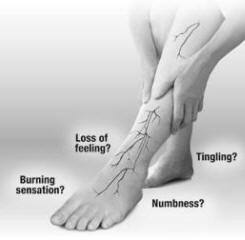Late effects: Peripheral neuropathy
Peripheral neuropathy (nerve damage) is a potential side effect of chemotherapy drugs. It is important to understand how peripheral neuropathy affects your body so you can manage this condition.

What is peripheral neuropathy?
Peripheral neuropathy is damage to the peripheral nerves - those nerves outside the brain or spinal cord. It may cause the hands or feet to hurt, tingle, and feel numb or weak.
Though the discomfort is felt in a muscle or joint, the real damage is to the nerves that control the muscles. Nerves are made up of special cells that carry messages to and from the brain and spinal cord. Damage to the nerve is often caused by a breakdown of the myelin sheath, the coating around nerve fibres that acts as an electrical insulator. There may also be direct damage to the nerve cells from pressure or trauma (for example from a tumour or surgery).
What are the symptoms?
Symptoms usually start during treatment and persist, and are not late in onset. Symptoms often improve once treatment has stopped, but for some people symptoms may persist for months or years.
The symptoms of peripheral neuropathy can include:
- Burning, tingling, or prickling sensation usually in the hands or feet
- Numbness or sensitivity to pain or temperature
- Extreme sensitivity to touch
- Sharp shooting pain
- Poor balance or coordination
- Loss of reflexes
- Muscle weakness
- Noticeable changes in the way you walk
Muscle weakness may begin around the arch of the foot and in the palm of the hand. It may be difficult to grip things or to perform certain tasks or activities such as writing, buttoning clothes, or tying shoes. The muscles that pull the foot up may weaken and the reflexes may be lost, causing the front part of the foot to fall flat to the floor. This may result in poor balance or coordination, especially when tired. There may be a tendency to drag the feet or lift them high to prevent the feet from dragging.
Who is at risk?
People who have received any of the following chemotherapy drugs may be at risk:
- Vincristine or vinblastine
- Cisplatin or carboplatin
- Thalidomide
- Velcade
People at highest risk for peripheral neuropathy are those who have received higher doses of these drugs or combinations of these drugs. Other causes or aggravators of peripheral neuropathy include excessive alcohol, vitamin deficiencies, immune diseases, surgery, severe weight loss, and diabetes or a pre-existing nerve disease.
Treatment
Rehabilitation services
Since there is no treatment that can cure or reverse nerve damage, treatment is directed toward symptom management.
Physiotherapy may be helpful in providing exercises to improve strength, balance, and coordination.
Occupational therapy can provide help to improve hand/eye coordination and other skills needed for daily life.
Orthotic devices
Support for feet or ankles can be improved with orthotic devices. Arch supports or splints help prevent the arch from flattening and help improve walking.
Pain management
Your doctor may prescribe medication to control the pain, tingling, and burning sensation. The type of medication depends on the frequency and severity of pain. It is also important to know that some medications will have side effects of their own. Elastic stockings, warm packs, or exercise may also help with the discomfort. These measures will not replace medication but may decrease the need for them. They may also assist in improving mobility and independence.
Additional recommendations:
- Avoid shoes that are too tight or too loose. Just as shoes that are too tight can cause throbbing, rubbing, and cramping, shoes that are too loose can worsen pain and may not provide enough support for already wobbly feet. Well-fitting sneakers or shoes that provide support but are also flexible are best.
- Be sensitive to temperature . Many people report that neuropathy feels worse in hot weather or when feet are heavily covered which may prevent adequate air circulation.
- Keep feet uncovered in bed. Bed sheets resting on toes can cause discomfort due to friction between the sheet and toes.
- Massage. Massaging your hands or feet, or having someone else massage them can be extremely soothing and relaxing and can increase circulation and boost endorphins (chemicals produced in the body that help control pain).
- Cool soaks. Cool water soaks to painful hands or feet can sometimes dull pain enough to fall asleep or until pain medication has time to work.

Late Effects Clinic
We care for and treat people who have ongoing health problems caused by cancer or cancer treatment.
Find out more